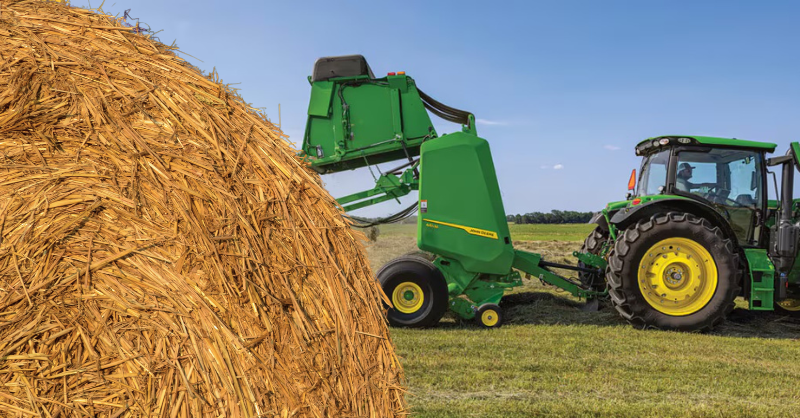When your John Deere tractor isn’t running smoothly, it can throw a wrench in your day. Whether it’s a small hiccup or a major issue, troubleshooting can feel overwhelming.
You want solutions that are easy to understand and apply, without wading through complex jargon. That’s where this guide comes in. It’s crafted with you in mind, to simplify the process of diagnosing and fixing those pesky problems. Imagine saving time and getting your tractor back to peak performance with straightforward steps.
Dive in to discover practical advice and insights that will empower you to tackle issues head-on. You’re just a few minutes away from mastering your tractor troubleshooting skills. Are you ready to get your hands dirty and ensure your John Deere is running as it should? Let’s get started.

Common Tractor Issues
Owning a John Deere tractor is a rewarding experience, but like any piece of machinery, it can encounter issues. Knowing how to identify and fix these problems can save you time and money. Let’s dive into some common tractor issues you might face and how to tackle them.
Engine Problems
Engine issues can bring your work to a halt. If your tractor engine is not starting, check the fuel level and ensure the fuel shut-off valve is open. A clogged fuel filter or air filter can also cause problems; replacing them might be the solution.
Overheating is another concern. Ensure the radiator is clean and the coolant level is adequate. If overheating persists, the thermostat or water pump might be the culprits. Have you ever considered how often you check these components?
Hydraulic System Failures
Hydraulic systems are crucial for your tractor’s performance. If you notice slow or no response from the hydraulic system, check the fluid levels first. Low hydraulic fluid can impede operations.
Leaks in the hydraulic lines are common. Inspect hoses and connections regularly for signs of wear or damage. Replacing worn parts can prevent bigger problems down the line.
Electrical Malfunctions
Electrical issues can be frustrating. A dead battery is a frequent problem; ensure it’s charged and the terminals are clean and tight. A simple battery replacement might be needed if it’s not holding a charge.
Fuses and wiring can also cause electrical malfunctions. Regularly inspect and replace blown fuses. Look for damaged wires which can lead to shorts or other issues. Have you checked these components recently?
Addressing these common issues early can keep your John Deere tractor running smoothly. What steps will you take to maintain your tractor’s health?
Engine Troubles
John Deere tractors are known for their reliability and strength. Yet, engine troubles can sometimes arise, causing frustration. Understanding these issues helps keep your tractor running smoothly. Let’s explore common engine problems and their solutions.
Starting Issues
Starting issues might stem from a weak battery. Check if the battery is charged and connections are clean. If the battery is strong, examine the ignition system. Faulty spark plugs can prevent starting. Replace worn-out plugs to ensure a proper spark. Fuel quality also affects starting. Stale fuel may clog the system. Use fresh fuel for better performance.
Overheating Concerns
Overheating occurs when the cooling system fails. Check the radiator for blockages. Dust and debris can hinder cooling. Clean the radiator regularly to maintain airflow. Also, inspect the coolant level. Low coolant can lead to overheating. Top up the coolant to prevent engine damage. Monitor temperature gauges during operation. It helps detect overheating early.
Unusual Noises
Unusual noises often indicate engine trouble. Listen for knocking sounds. These might mean worn bearings. Regular oil changes can prevent bearing wear. Rattling noises could mean loose parts. Tighten any loose components immediately. Grinding noises may suggest gear issues. Check gears for wear or damage. Address unusual noises promptly to avoid further issues.
Hydraulic System Challenges
Hydraulic system challenges can affect the performance of John Deere tractors. Efficient hydraulics ensure smooth operation and power. Understanding common issues helps in maintaining optimal performance. Addressing these challenges promptly prevents further damage and costly repairs.
Slow Lifting
Slow lifting is a frequent issue in hydraulic systems. It often indicates low hydraulic fluid levels. Check fluid levels regularly to maintain efficiency. Clean filters ensure smooth fluid flow and prevent blockages. Check for worn-out components, as they can hinder performance. Regular maintenance keeps lifting operations swift.
Leaking Fluid
Leaking fluid can cause significant problems. It may result from damaged seals or connections. Inspect seals and hoses for wear and tear. Tighten loose connections to prevent leaks. Replace damaged parts promptly to avoid further issues. Routine checks help detect leaks early.
Inconsistent Power
Inconsistent power affects tractor efficiency. It may stem from air in the hydraulic system. Bleeding the system removes air and restores power. Faulty pumps can also cause power fluctuations. Regular checks ensure pumps function correctly. Maintaining optimal pressure levels ensures consistent power delivery.
Electrical System Faults
Experiencing issues with your John Deere tractor’s electrical system can be frustrating, especially when you need to get work done. These problems might range from battery drain to lighting glitches or fuse troubles. Understanding how to troubleshoot these common faults can save you time and money. Let’s dive into some practical solutions for these electrical challenges.
Battery Drain
Have you ever noticed your tractor’s battery losing charge faster than usual? This is a common issue many John Deere owners face. It might be due to a weak alternator or an unnoticed parasitic draw.
Start by checking the connections. Are they clean and tight? A loose or corroded connection can cause significant drain. If the connections are fine, inspect the alternator. It’s crucial to ensure it’s functioning correctly and charging the battery efficiently.
Consider using a multimeter to check for any parasitic draw when the tractor is off. This tool can help you pinpoint whether there’s an abnormal power usage that’s draining your battery.
Lighting Problems
Imagine needing to use your tractor at dusk, only to find the lights are not working. Lighting issues can stem from blown bulbs, faulty wiring, or a malfunctioning switch.
Begin by checking the bulbs. Are they burnt out? Replacing them is a simple fix. If the bulbs are intact, inspect the wiring for breaks or loose connections. Wiring issues are often overlooked but can be the root cause.
Don’t forget to test the light switch. Sometimes, a faulty switch can prevent the lights from turning on. Replacing it might be the solution you need.
Fuse Issues
Fuses are crucial for protecting your tractor’s electrical system from overloads. But what happens when they blow frequently? This could indicate a deeper electrical fault.
Check the fuse box. Are the fuses the correct rating? Using the wrong type can lead to repeated blowouts. Look for any signs of damage or corrosion in the fuse box, which could affect performance.
If you find yourself replacing fuses often, investigate further for underlying issues like short circuits or faulty components. Addressing these problems can prevent future fuse failures.
Have you ever tackled an electrical fault on your tractor? What was the most surprising discovery during your troubleshooting journey? Share your experiences and tips in the comments below, and let’s learn from each other!
Transmission Glitches
Transmission glitches can disrupt your John Deere tractor’s performance. Understanding common issues helps keep your tractor running smoothly. This guide highlights key transmission problems and provides solutions.
Gear Shifting Difficulties
Gear shifting difficulties occur when gears resist movement. This can cause operational delays. Check the clutch pedal first. Ensure it fully disengages. Inspect the gear linkage too. It might need adjustment or lubrication.
Unusual Vibration
Unusual vibration often indicates an imbalance. This affects tractor stability. Examine the drive shaft and universal joints. They may be worn or misaligned. Replacing damaged parts restores smooth operation.
Strange Odors
Strange odors might signal transmission fluid issues. Burning smells often mean overheating. Check fluid levels immediately. Low fluid can cause severe damage. Consider changing the fluid if it’s dark or burnt.

Steering And Brake Concerns
Steering and brake issues can affect your tractor’s performance. A well-maintained steering and brake system ensures smooth operation. This guide will help you identify common problems and their solutions. Let’s focus on steering wheel stiffness, brake pedal sponginess, and uneven braking.
Steering Wheel Stiffness
If your tractor’s steering feels tight, it could be a problem. Low hydraulic fluid levels often cause stiffness. Check the fluid level and refill if necessary. Inspect the steering components for wear or damage. Tighten loose connections to improve movement. Regular maintenance prevents steering issues.
Brake Pedal Sponginess
Spongy brakes can reduce stopping power. Air in the brake lines often causes this issue. Bleed the brakes to remove trapped air. Inspect brake pads for wear and replace if needed. Check for leaks in the brake system. Keep the brake fluid at the recommended level.
Uneven Braking
Uneven braking can be dangerous. It often results from worn brake pads or misaligned components. Check the brake pads for uneven wear. Align the brake components for consistent braking. Inspect the rotors for damage or warping. Regular checks ensure safe and smooth braking.
Maintenance Tips
Explore essential tips for maintaining your John Deere tractor using this troubleshooting guide. Keep your tractor in top shape with easy-to-follow steps. Identify common issues quickly and ensure smooth operation. Regular checks and simple fixes can prevent bigger problems down the road.
Maintaining a John Deere tractor can be a rewarding experience, ensuring it runs smoothly and efficiently for years. With regular care, you can prevent common issues that might interrupt your work. Imagine having the peace of mind knowing your tractor won’t let you down right in the middle of a crucial task. Here, we delve into essential maintenance tips to keep your John Deere tractor in top-notch condition.
Regular Inspection
Regular inspections are your first line of defense against potential problems. Make it a habit to check your tractor before and after use. Look for signs of wear and tear, loose bolts, or fluid leaks. A simple walk-around can save you hours of downtime later. Think of it like checking your car’s mirrors before driving; you wouldn’t skip it, right?
Proper Lubrication
Lubrication is crucial for smooth operation. Without it, parts can grind and create friction, leading to damage. Ensure all moving parts are well-oiled, especially the engine and hydraulic systems. You might be surprised at how this simple act can prevent costly repairs. Ever noticed how a squeaky door hinge quiets down with a bit of oil? Your tractor deserves the same attention.
Timely Replacement Of Parts
Parts wear out, and timely replacement is key to keeping your tractor running efficiently. Keep an eye on components like filters, belts, and spark plugs. Replacing them at the right time can prevent major breakdowns. Consider how changing your car’s oil regularly keeps the engine healthy. Your tractor’s parts need similar care to avoid unexpected failures. Maintenance isn’t just about fixing issues; it’s about preventing them. What steps will you take today to ensure your tractor is ready for tomorrow?
Expert Advice
Expert advice can be your best ally when troubleshooting your John Deere tractor. Whether you’re a seasoned farmer or a new tractor owner, understanding when to seek professional help and when to roll up your sleeves for a DIY fix can save you time and money. Let’s dive into some practical tips and tricks from the experts.
When To Call A Professional
Sometimes, the best course of action is to admit you’re out of your depth. If your tractor is making unusual noises or if there are issues with the hydraulic system, it’s wise to consult a professional. These are complex problems that require specialized tools and expertise.
Electrical problems, such as persistent battery drainage or wiring issues, also need a professional’s touch. Attempting to fix these on your own could lead to more significant damage. It’s crucial to weigh the risks of DIY against the potential cost savings.
Are you experiencing frequent breakdowns despite regular maintenance? This might indicate deeper, underlying issues that only an expert can diagnose. Trusting a professional ensures your tractor’s longevity and optimal performance.
Diy Fixes
Not every problem requires a professional. Many issues can be resolved with simple DIY fixes. If your tractor struggles to start, check the fuel system for blockages. Cleaning or replacing a clogged fuel filter can often do the trick.
Regularly inspect and replace air filters to ensure efficient engine performance. A dirty air filter can lead to poor fuel economy and reduced power. Keep an eye on tire pressure as well; underinflated tires can affect traction and lead to uneven wear.
If your tractor’s performance is sluggish, a quick check of the spark plugs might reveal fouling or damage. Cleaning or replacing them could restore your tractor’s power. Remember, simple maintenance can prevent many issues from escalating.
Preventive Measures
Preventive measures are key to reducing the likelihood of tractor troubles. Establish a regular maintenance schedule to keep your tractor in top shape. Changing oil and filters at recommended intervals can prevent engine wear.
Keep your tractor clean to spot potential issues early. Dirt and debris can hide leaks or cracks that might worsen over time. Regular cleaning also prevents rust and corrosion.
Store your tractor in a dry, sheltered place when not in use. Exposure to harsh weather can accelerate wear and tear. How do you ensure your tractor remains reliable? By taking these preventive steps seriously, you can minimize downtime and maximize productivity.

Frequently Asked Questions
Why Won’t My John Deere Tractor Start?
Check the battery first. Ensure connections are tight. Inspect the ignition switch and fuel system.
How To Fix A John Deere Hydraulic Leak?
Identify the leak source. Replace damaged seals or hoses. Check fluid levels regularly to prevent issues.
What Causes John Deere Engine Overheating?
Blocked radiator or faulty thermostat. Clean the radiator and check coolant levels. Ensure fans work properly.
How Do I Solve Electrical Issues In John Deere?
Inspect wiring for damage. Ensure fuses and switches are working. Consult a professional if problems persist.
Why Is My John Deere Tractor Making Noises?
Loose components or worn bearings. Tighten bolts and replace worn parts. Regular maintenance prevents noise issues.
Conclusion
Solving tractor issues can be simple with the right guide. This troubleshooting guide helps keep your John Deere running smoothly. Regular checks can prevent many problems. Follow the steps outlined to maintain efficiency. Always keep a toolkit handy for quick fixes.
Remember, routine maintenance saves time and money. Consult a professional if issues persist. Happy farming with your reliable tractor!





